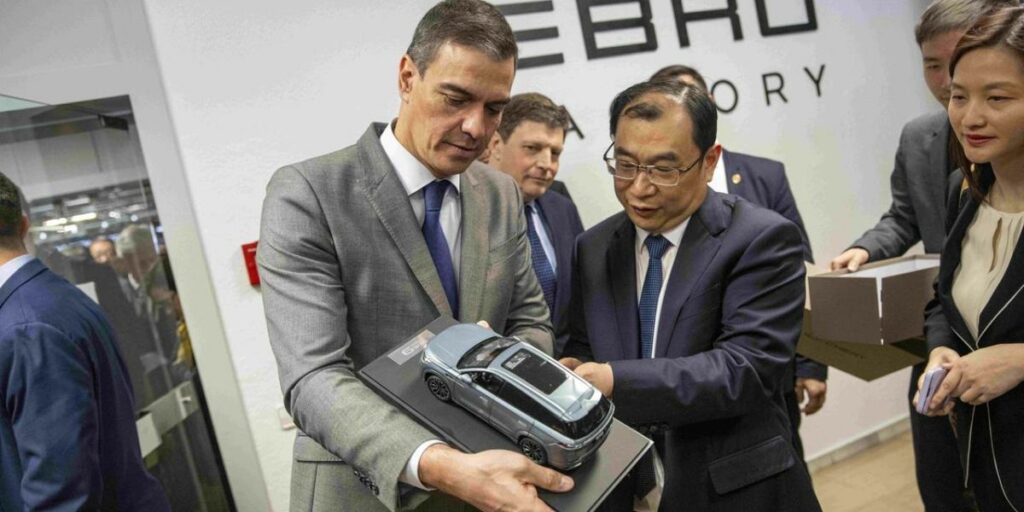A showroom in Budapest sells EVs made by BYD, which has plans to start production in Hungary. – Akos Stiller/Bloomberg News
Hedging China Shock 2.0 and Trump 2.0
At the core of this strategy is a fear that Europe, and especially Germany, which relies much more on manufacturing than the U.S., could be hit by one of two nightmare scenarios: a global trade war, or a new flood of cheap Chinese imports.
European Union regulators this month signaled plans to impose relatively modest tariffs—the highest will be half the 100% recently announced by President Biden—on Chinese auto imports. Some analysts saw this as an implicit encouragement to Chinese producers to shift auto factories to Europe instead, which some have started doing.
China’s commerce minister, Wang Wentao, and his EU counterpart, trade commissioner Valdis Dombrovskis, spoke by videoconference on Saturday and agreed to start consultations on the EU’s antisubsidy investigation into Chinese electric vehicles, China’s ministry said.
Story continues
EU spokesman Olof Gill said the two sides had a “candid and constructive” call and would continue to engage in the coming weeks. “The EU side emphasized that any negotiated outcome to its investigation must be effective in addressing the injurious subsidization,” he said.
For both Europe and China, closer cooperation would hedge against a return to the White House by Donald Trump, who is pledging 10% across-the-board tariffs on imports. That threat argues against Europe fully throwing in its lot with the U.S., while encouraging China to smooth over tensions with Europe and maintain access to its lucrative market.
If so, Europe’s industrial and technological ties to China could strengthen as the U.S.’s weaken. And Chinese car brands will play an increasingly important role in Europe, but no role in the U.S.
The EU’s approach “accepts that the China-EU industrial complex exists and is explicitly trying to encourage more of it,” said Jacob Kirkegaard, senior fellow with the Peterson Institute for International Economics.
This poses risks for Europe, said Noah Barkin, Europe-China expert at Rhodium: “If the European car industry remains deeply integrated with China and the U.S. industry is completely decoupled from China, that is likely to lead to bilateral tensions between the EU and U.S.” Indeed, Europe exports twice as much to the U.S. as it does to China.
Europe’s manufacturing sector has a lot to lose
Why risk that? Europe’s car industry is deeply intertwined with China’s already through joint ventures that have a large share of China’s market. About a third of Volkswagen’s sales and a big share of its profit are in China.
Moreover, Europe has more to lose than the U.S. from a breakdown in global trade. It has 2½ times as many manufacturing jobs, and more than a third of its manufactured goods are exported, versus one-fifth for the U.S., former Italian Prime Minister Mario Draghi said in a speech this month.
Manufacturing comprises 15% of Europe’s overall output, and 18% of Germany’s, compared with 11% of the U.S.’s, reflecting specialization in high-tech engineering tools and machinery that helped to power China’s rise. But China increasingly competes in products it used to buy from Europe. Its companies produce more industrial machines and equipment than their rivals in the U.S., Germany and Japan combined.
“The first China shock was a net positive for Germany,” said Moritz Schularick, president of the Kiel Institute for the World Economy. “The second shock is a real wake-up call.”
China once welcomed foreign investment as a way to import new technology. Now, said Barkin, “We are in a position where Europe is keen for transfers of technology to flow in the other direction.”
China is likely to produce seven million battery-powered EVs this year, up from five million last year, said Ferdinand Dudenhoeffer, a German auto industry expert. Europe is likely to produce 1.2 million this year, down from 1.5 million last year, he said. This advantage of scale enabled Chinese manufacturers to move ahead of international competitors in technology for electric vehicles, including batteries.
Allowing Chinese manufacturers to grow in Europe could help European manufacturers by encouraging more people to switch to EVs, and governments to build charging infrastructure, some analysts say. Another advantage: The U.S. electric-vehicle market could lag behind Europe and China’s, with inferior technology and higher prices.
Given the risk if Trump is re-elected, Europe should be more open to China as a hedge, Dudenhoeffer said. “Chinese manufacturers will help us go faster into the future…The big growth region is Asia, not the U.S.,” he said.
Write to Tom Fairless at tom.fairless@wsj.com
Most Read from The Wall Street Journal
Source link : https://finance.yahoo.com/news/europe-response-china-shock-2-040100413.html
Author :
Publish date : 2024-06-23 21:06:00
Copyright for syndicated content belongs to the linked Source.
